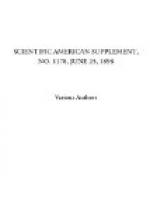The Germans, therefore, as a rule, have sought some other means than all those above mentioned. Almost all the German writers on ethnography divide the people and nations of the world into two great classes—the one they call the “wild peoples,” the other the “cultured peoples”—the “Natur-Voelker” and the “Kultur-Voelker.” The distinction which they draw between these two great classes is largely psychological. Man, they say, in the condition of the “wild people”—of the “Natur-Voelker”—is subject to nature; therefore, they call them “nature people.” The “Kultur-Voelker,” on the other hand, have emancipated themselves, in great measure, from the control of nature.
Furthermore, the man in the condition of the “wild people” is in a condition of practically unconscious life: he has not yet arrived at self-consciousness—he does not know and recognize his individuality—the “Ego”—“das ich;” that is a discovery which comes with the “Kultur-Voelker”—with the “cultured people;” and just in proportion as an individual (or a nation) achieves a completely clear idea of his own self-existence, his self-consciousness, his individuality, to that extent he is emancipated from the mere control of nature around him and rises in the scale of culture.
Again, to make this difference between the two still more apparent, it is the conflict between the instinctive desires and the human heart and soul and the intelligent desires—those desires which we have by instinct, which we have by heredity and which have been inculcated into us wholly by our surroundings, which we drink in and accept without any internal discussion of them: those are instinctive in character. We go about our business, we transact the daily affairs of life, we accept our religion and politics, not from any internal conviction of our own or positive examination, but from our surroundings. To that extent people are acting instinctively; and, as such, they are on a lower stage of culture than those who arrive at such results for themselves through intelligent personal effort. This is a real distinction also, although somewhat more subtle, perhaps, than the ones previously given. Therefore, the differentiation made by the German ethnographers between wild people and the cultured peoples is, in the main, right; but it does not admit of any sharp line of distinction between the two. We cannot draw a fixed line and say, “On this side are the cultured people and on that the wild,” because there are many tribes and nations who are about that line, in some respects on one side of it, in others on the other; but in a broad, general way this distinction (which is now universally adopted by the German writers) is one we should keep in our minds as being based upon careful studies and real distinctions.




